November 7, 2025
Air Date: November 7, 2025
FULL SHOW
SEGMENTS
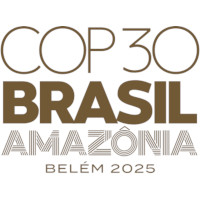
UN Climate Talks Kick Off in Brazil
View the page for this story
The biggest climate negotiations of the year, COP30, are kicking off in Belem in the Brazilian Amazon. Longtime COP observer Jennifer Morgan is a former executive director of Greenpeace and former state secretary and special climate envoy for Germany who is now a senior fellow at Tufts University. She joins Host Steve Curwood to preview COP30 and discuss the focus on closing the gap between current greenhouse gas reduction policies and what’s needed to limit warming to a safer level. (13:27)
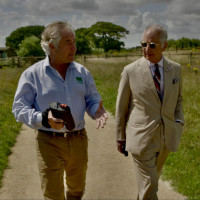
Pope and King Share a Prayer for Creation
View the page for this story
King Charles III, who leads the Anglican Church, and Pope Leo XIV, who leads the Roman Catholic Church, recently joined in a historic prayer in the Sistine Chapel. This act of unity by these two faith leaders who are also sovereign heads of state was embedded in their shared concern for the environment, or creation. Tony Juniper coauthored King Charles's book on the environment, Harmony and chairs Natural England, a government conservation agency. He speaks with Host Steve Curwood about how these leading Christians may make a difference for the planet. (13:29)
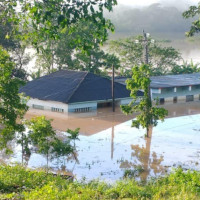
Hurricane Melissa Recovery Effort
View the page for this story
As one of the strongest hurricanes ever documented in the Atlantic, Hurricane Melissa brought catastrophic damage to Jamaica and Cuba, and an extensive relief and recovery effort is now underway. Marianna Kuttothara is Head of Health, Disaster, Climate and Crisis for the Americas at the International Federation of Red Cross and Red Crescent Societies and joins Host Jenni Doering to talk about the aid efforts, long road to recovery, and importance of building back better. (09:06)
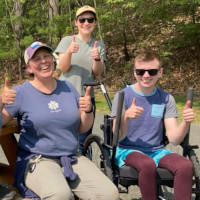
Hiking on Wheels
/ Jenni Doering & El WilsonView the page for this story
Physical disabilities can make getting outside more challenging, but adaptive devices and accessible trails can transform lives. Producer El Wilson, who has cerebral palsy, and producer Jenni Doering test an offroad wheelchair and meet a woman who has been able to reclaim the joy and freedom of hiking since becoming disabled. (09:54)
Show Credits and Funders
Show Transcript
251107 Transcript
HOSTS: Steve Curwood, Jenni Doering
GUESTS: Tony Juniper, Marianna Kuttothara, Jennifer Morgan
REPORTERS: Jenni Doering
[THEME]
CURWOOD: From PRX – this is Living On Earth.
[THEME]
CURWOOD: I’m Steve Curwood.
DOERING: And I’m Jenni Doering.
The annual UN climate talks kick off in Brazil.
MORGAN: I feel determined, and worried, worried about the pace of change that's not fast enough and determined to work with the thousands who will be there to accelerate that pace of change and not let one country that's trying to slow it down hold the rest of the world back.
CURWOOD: Also, Pope Leo and King Charles pray together about care for creation.
JUNIPER: For these leaders to be thinking about the joint teachings of the Anglican Church and the Catholic Church in ways that brings creation and God's work back to center stage, I think is a really, really important part of how we begin on this journey towards a more sustainable and harmonious future.
CURWOOD: That and more, this week on Living on Earth. Stick around!
[NEWSBREAK MUSIC: Boards Of Canada “Zoetrope” from “In A Beautiful Place Out In The Country” (Warp Records 2000)]
[THEME]
UN Climate Talks Kick Off in Brazil
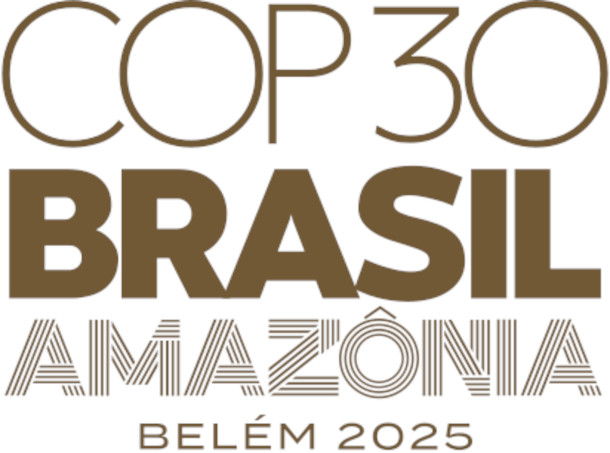
This year’s Conference of the Parties is being held in Belém, Brazil, from November 10th through 25th. An estimated 50,000 to 60,000 attendees are expected to arrive from around the world. (Photo: United Nations Framework Convention on Climate Change, Wikimedia Commons, Public Domain)
DOERING: From PRX and the Jennifer and Ted Stanley studios at the University of Massachusetts Boston, this is Living on Earth. I’m Jenni Doering.
CURWOOD: And I’m Steve Curwood.
The biggest climate negotiations of the year are kicking off, with world leaders and climate experts from more than 190 countries coming to Belem in the Brazilian Amazon. COP30 is this year's conference of the parties to the UN Climate Treaty. And this gathering comes as the momentum of climate disruption grows with massive heat waves, wildfires, severe storms, floods, rising sea levels and melting polar regions. Joining us now is Jennifer Morgan, a former Executive Director of Greenpeace, and former State Secretary and Special Climate Envoy for Germany. She's now a Senior Fellow at Tufts University. Jennifer, COP 30 marks thirty years of these talks. How is this year's session? Is it both a moment of reflection of past work and a turning point of future progress, do you think?
MORGAN: I think it's both, I think the reflection is occurring as we speak, reports are coming out about, what is the difference from 10 years ago, whether it be in temperature rise that has been lowered, you know, the world was on track for a 7.2 degree Fahrenheit rise in temperature 10 years ago. Now, the UNEP report has just come out and said it's more like a four degree Fahrenheit rise in temperature. So there's been a decline, which is good, but not enough, of course. And I've heard a lot of people discussing what's been happening in the energy sector. I think 10 years on, things have happened that I certainly couldn't have imagined in Paris. You know, we are seeing solar capacity being deployed annually at 15 times what was predicted in 2015, we're seeing EVs, then it was one in 100 being sold. Now it's one in five cars being sold are electric vehicles. So I think it's important to reflect on that, but then to say, okay, how do we accelerate? We've got this positive foundation, countries are coming forward with their national plans, the institutions are working, but we're far off course of where we need to be. And I think that is the key topic at this COP is, how do we accelerate action? How do we close that gap where we know we need countries to be doing more, the private sector to be doing more in a way that drives economic prosperity and resilience and stability.
CURWOOD: Who are the key players at this year's Conference of the Parties, at this COP? Which countries or leaders should the public be watching here?
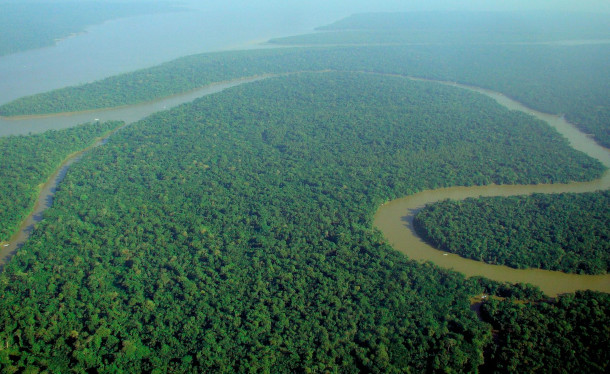
Brazil contains the largest portion of the Amazon rainforest, making biodiversity and deforestation control a keystone of this year’s COP. (Photo: lubasi, Wikimedia Commons, CC BY-SA 2.0)
MORGAN: Well, obviously Brazil. Brazil is the president of this COP, President Lula has been very engaged, and they are hosting this meeting in the Amazon. And Brazil has a very strong history of diplomatic successes. So I think how they pull this all together is absolutely fundamental, so watching what they are doing as a major emerging economy is key. China, also world's largest emitting country, also massive growth in green products moving forward, what role will they play? Will they step into the U.S.'s footsteps at all in perhaps more leadership with Chinese characteristics, what does that look like? The European Union working to integrate climate and decarbonization to become the world's first decarbonized, carbon neutral continent, they traditionally have played a leadership role working with developing countries. So it's always important to listen to what the small islands are saying, the least developed countries, we know they are on the front line, and so listening to the alliance of small island states, that's normally where I start. But then these other players need to come along, obviously as well.
CURWOOD: And by the way, Brazil is also now a major producer of oil, as well as having a big piece of the Amazon. How do those contradictions affect the country's leadership in this year's COP, do you think?
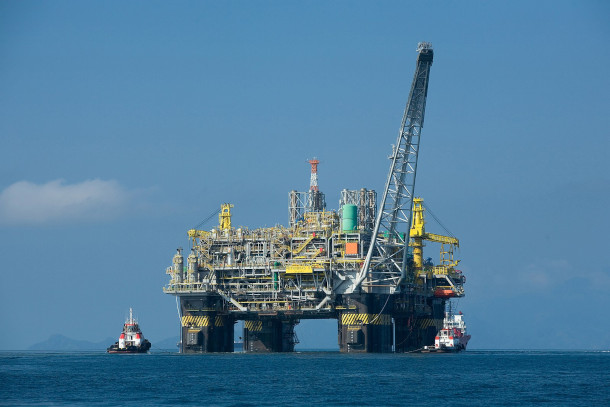
Despite its strong commitments to climate and rainforest protection, Brazil is aiming to become a large producer of offshore oil and even began oil drilling near the Amazon River for the first time a few weeks ago, just before the UN conference. Above, the first 100% Brazilian oil platform, the P-51, in January 2009. (Photo: Divulgação Petrobras, Wikimedia Commons, CC BY 3.0 BR)
MORGAN: Well, it's clear Brazil is struggling with the transition, as I would say, all countries are finding their way. On the one hand, numbers just came out that showed that 2023 there was a decrease of 11.6% of deforestation happening compared to the year before. This is a very positive development. But Brazil is also looking to explore oil and gas and those resources, and I think it needs, therefore, to be actually leaning more into its clean energy possibilities, which it has. And that's where this COP is so important, that oil and gas producing countries like Norway, like Canada, like Australia, like Brazil, that they all come together and say, we really mean it, that we're going to transition away from fossil fuels in a just way. And this is our roadmap for how we're going to get there, even if we know right now we're not going in the right direction.
CURWOOD: Now, the Paris Agreement required each participating country to make nationally determined contributions, NDCs, to reduce national emissions and curb climate disruption. What do you expect will change regarding these commitments in this year's COP? What commitments are being made? What commitments are you waiting on?

Another big theme at COP30 is supporting countries in moving towards a just energy transition. Jennifer Morgan says India is stepping up as a leader in this sector by meeting 50% of the country’s energy demands with renewables over the summer. Above, a solar thermal power plant in Rajasthan, India. (Photo: Bkwcreator, Wikimedia Commons, CC BY-SA 3.0)
MORGAN: Well, at this year's COP, every country was committed as part of the Paris Agreement to put forward every five years an updated, nationally determined contribution. Many of those have come in, I would expect that they're still coming in. You know, we are still waiting for a few but I think all eyes have been on China and its NDC, as they're called, because they are the largest emitter, where they've put forward, certainly a very stable NDC and economy wide, with all the greenhouse gasses, which is new and big, and saying they're, for the first time, committing to absolutely reduce their emissions, but the ambition is less than what actually most analysts say they're going to achieve. So it's an under, lowballing, I guess you would say, of its commitment. Where does India come in? We've seen recently, renewables has met over 50% of total electricity demands in July, on a day this year. They're moving in that direction, its own transition. Will they be ready to step forward? And then, of course, Saudi Arabia will be also interesting to watch. I just mention them because, on the one hand, what I observe is Saudi Arabia is diversifying its national economy and moving into solar. They are investing massively in solar domestically and also in Africa, but clearly has a big interest to continue to export its oil and gas.
CURWOOD: And by the way, the United States is not participating in this Conference of the Parties, it seems. What does that mean?
MORGAN: Formally, it means that in the Paris Agreement, there will be no one sitting behind the US flag. You know, you sit at a table. Everybody has their names of their countries ahead of them and speaks so there'll be no US voice negotiating around these different decisions that need to be moved forward at this COP, I think it's a great loss for the United States not to have a voice in negotiating not only the future of our stable climate, but also the framework for future markets and current markets, but it means that other countries will be making these decisions. And obviously there will be other voices there. I think that there are voices coming from governors and representatives and business certainly, but the federal government will be absent.
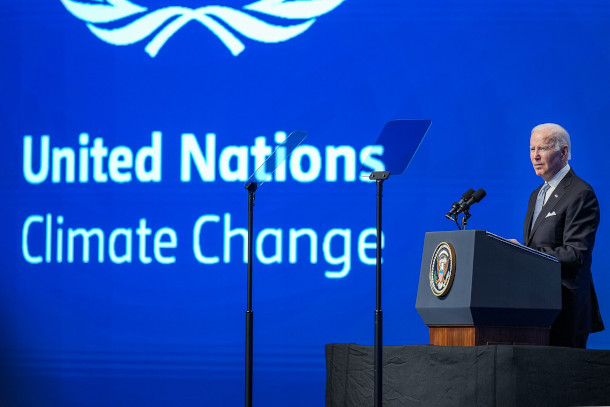
The United States, the largest historical emitter of greenhouse gases, will not have a federal representative at this year’s conference. Above, former President Biden pledged the U.S.’s commitment to climate at COP27 in Egypt. (Photo: White House, Wikimedia Commons, Public Domain)
CURWOOD: On a top line basis, what are the things that need to be decided at this Conference of the Parties, at COP30?
MORGAN: So it's a different kind of a COP, because there's not some big bang thing that's going to happen at five in the morning on the last day, but rather, there's a series of signals, decisions, and I would call them proof points, to demonstrate that they're accelerating action. So first of all, I think a very important decision is on adaptation, on how to build more resilient infrastructure, houses, food systems, to the impacts that are already happening. That, there's indicators, which is a very practical way of trying to see, okay, what needs to happen by when. And then, how is that going to be financed? More funding for that adaptation for the most vulnerable countries, that's a very important, for example, outcome for Africa. There will be a discussion on forests, of course, being in the Amazon, and there, I would say, signals of meeting that goal and accelerating around zero deforestation by 2030 that was set two years ago. But also, Brazil has put forward a Tropical Forest Forever Fund, a new financing mechanism for standing forests to avoid deforestation in the future. So which countries might sign up to that? How will that get financed? And then third, I would put forward the energy issue. Two years ago, countries decided to transition away from fossil fuels in a just, orderly, equitable fashion and triple renewables. They're not on track for that. There is a lot of progress on renewables. It still hasn't been tripled. So there are discussions, maybe there should be a roadmap of how to actually do that transition, where you have the different pathways being discussed, and then looking at what are the initiatives around grids, around storage that really can help overcome barriers so that that transition to renewables can accelerate.
CURWOOD: In the news, it's been Hurricane Melissa here in the Western Hemisphere, really shredding places like Jamaica and Cuba. And these smaller island states are very concerned about the climate crisis. What might we hear in terms of discussions about loss and damage in countries in the tropics, in the Global South, or how reparations might be made at this point?
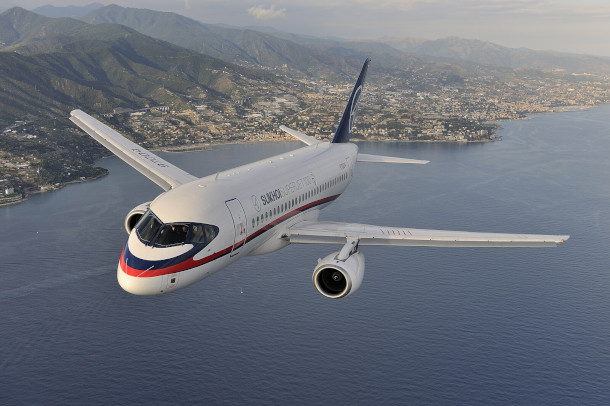
In the wake of Hurricane Melissa, it’s clear that small island nations suffer the brunt of climate woes. One way these nations are planning to raise funds for climate reparations is through a levy on premium flight tickets and private jets. (Photo: Katsuhiko Tokunaga, Wikimedia Commons, CC BY-SA 2.0)
MORGAN: Well, loss and damage is something that small island nations fought for a fund for 30 years that was established a few years ago, and now it's really about providing funds for that loss and damage, response to loss and damage fund. So I would expect to hear pressure for pledges for that but also some new approaches. So, there is a group of countries that's going to be coming forward. They've already stated their intent on this, like France and Spain and Kenya and some small island nations, to put a solidarity levy on premium tickets, so first class, business class flights and private jets, and that group has said, we need a new, innovative way of funding loss and damage, also adaptation, because we know that public budgets are tight, and we also know that the numbers around these damages are just absolutely huge. So I would look out for that coalition, premium flyers group that's coming forward, and also other ideas on how actually to raise the money.
CURWOOD: Now, the UN Framework Convention on Climate Change operates under consensus, meaning that all participating parties must agree on terms before they can be applied. So to what extent does this rule of consensus make it difficult to reach climate goals, and what changes, if any, are being discussed along those lines?
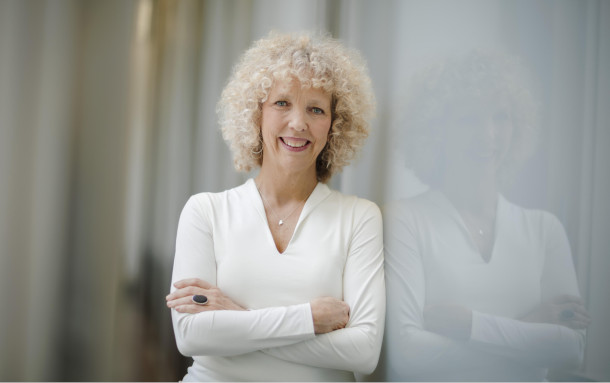
Jennifer Morgan is an American-German environmental activist specializing in climate change policy. From 2022 to 2025, she was the special representative for international climate policy of the Federal Foreign Office in Germany. From 2016 to 2022, Morgan co-led Greenpeace International. (Photo: Photothek)
MORGAN: Well, certainly having to have consensus of all countries together, on the one hand, is a good thing, because everybody has had to agree, but clearly it also enables those that want to move more slowly, to slow things down, whether it's on emission reductions or whether it's on finance. And I think that has made it more difficult, and this year, and I think moving into the future, there is a new discussion about reform of the process, with different ideas coming forward. And one that certainly has been raised by scientists and by even some countries, has been to revise what's called the rules of procedure, the voting rules at the climate meeting. I doubt that will be possible this year, that would be a multi-year effort. But I think it's important to be looking at how to make the UN Framework Convention more efficient. We need these multilateral approaches more than ever, and so finding ways of increasing their effectiveness is key.
CURWOOD: You've been going to these Conferences of the Parties, I guess it's COP30, you've been to 30 of them. How do you feel this year about this one?
MORGAN: I feel determined and worried, worried about the pace of change that's not fast enough, and determined to work with the thousands who will be there to accelerate that pace of change and not let one country that's trying to slow it down hold the rest of the world back.
CURWOOD: Jennifer Morgan is a climate activist, a former German diplomat on the climate, and former Executive Director of Greenpeace. Thank you so much for taking the time with us today.
MORGAN: Great to be with you.
Related links:
- Live updates from COP30
- Learn more about Jennifer Morgan
[MUSIC: Dois Sóis - Rezo · Rebecca Durães, Bruno Rubano, “Mulambo É de Macumba” Single, Mahadeva Studios]
DOERING: Coming up, recovery efforts from deadly Hurricane Melissa are underway in the Caribbean. That’s just ahead on Living on Earth. Stay tuned!
ANNOUNCER: Support for Living on Earth comes from the estate of Rosamund Stone Zander - celebrated painter, environmentalist, and author of The Art of Possibility – who inspired others to see the profound interconnectedness of all living things, and to act with courage and creativity on behalf of our planet. Support also comes from Sailors for the Sea and Oceana. Helping boaters race clean, sail green and protect the seas they love. More information @sailorsforthesea.org.
[CUTAWAY MUSIC: Gabriella Vargas Luna, “Sentido” Single, Gabriella Vargas Luna]
Pope and King Share a Prayer for Creation
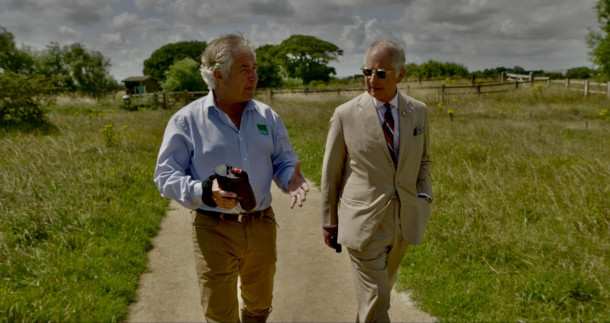
Tony Juniper spoke with King Charles III in July 2023 at a new nature reserve in a group of 25 reserves called “The King’s Series.” (Photo: Courtesy of Tony Juniper)
DOERING: It’s Living on Earth, I’m Jenni Doering.
CURWOOD: And I’m Steve Curwood.
[CHOIR SINGING]
CURWOD: The serene music of the choirs of Windsor Castle and Saint James chapel children, along with the choir of the Sistine Chapel floated up to the famous ceiling painted by Michelangelo during a most historic gathering this October. It was part of the very first public prayer bringing together King Charles III, supreme governor of the Anglican Church, and Pope Leo XIV, supreme pontiff of the Roman Catholic Church and it ended five centuries of separation. This act of unity by these two faith leaders who are also sovereign heads of state was embedded in their shared concern for the environment, or creation. Pope Leo offered a prayer:
POPE LEO: Let us pray. God our father you have created the heavens and the earth and made us in your own image. Teach us to see your hand in all your works and your likeness in all your children. Through Christ our Lord. Amen.
CURWOOD: Under the leadership of Pope Francis, Pope Leo's immediate predecessor, in 2015 the Catholic Church issued Laudato Si and later Laudate Deum, a pair of encyclicals that spiritually detailed the urgent need and morality of caring for creation. And When King Charles was the Prince of Wales, he wrote Harmony: A New Way of Looking at Our World. It was also a moral document steeped in spirituality with its detailed call for sustainability, action on climate change and the protection of nature.
This new unity of the Catholic and Anglican Churches brings together more than a billion people of faith under two leaders with deep understanding of our imperiled Earth.
For some insight as to how these leading Christians may make a difference for the planet, we turn now to Tony Juniper, who was a coauthor of King Charles's Harmony.
He's also a former head of Friends of the Earth UK, and now chairs Natural England, a government conservation agency. Welcome back to Living on Earth, Tony!
JUNIPER: Lovely to see you again, Steve, and nice to have a little chance to catch up.
CURWOOD: So recently, we had Pope Leo and King Charles III praying in the Sistine Chapel together. How big a deal was this, Tony?
JUNIPER: This is a hugely significant and historic moment, because this is the first time we've had such a coming together in prayer of the head of the Anglican Church and the leader of the Catholic Church since the Anglican Church was formed when Henry VIII broke away from the Roman church in 1533, and it was a time of really quite considerable upheaval across Europe in what has become known as the Reformation, with other religious movements breaking away from Rome. So this coming together of these two leaders at this point, it is very significant, because it's not happened before, and comes in the wake of some really very dramatic history.
CURWOOD: And according to the Vatican, during their meeting, Pope Leo and King Charles discussed some of their shared interests, including alleviating poverty and caring for the environment. How important were those subjects for this meeting?
JUNIPER: Well, I think very significant. I don't know what the details of the conversations or the prayer included, but evidently, this focus on ecological concerns and the protection of creation is a shared passion and really matter of spiritual identity for both of these leaders. And so that statement of common endeavor on these questions at this time, in particular, when we do have this retreat in some places, away from the ambition that we need to tackle this twin crisis of nature decline and climate change. That is very significant indeed.
CURWOOD: Tony, you've advised the King on the environment and climate for a long time as King, as Prince of Wales. Tell me, how has the king advocated for the earth over those years?
JUNIPER: Well, he has been a consistent, powerful, articulate champion of the natural world and people's place within it, and that needing to be a more harmonious relationship. He's been bringing this message to the world now since the early 1970s, so for more than five decades. And there are a variety of subjects that he's brought to our attention from the need to sustainable agriculture to the need to protect the tropical rainforests, to the challenges posed by climate change and all of these issues and many, many others, he has been a vocal champion of, but in relation to this meeting with the supreme leader of The Catholic Church, you know, you see a coming together, not only of those concerns which sometimes are expressed in scientific terms or which are about policy. This is a deeply spiritual matter for King Charles, and of course, is so also for the Pope.
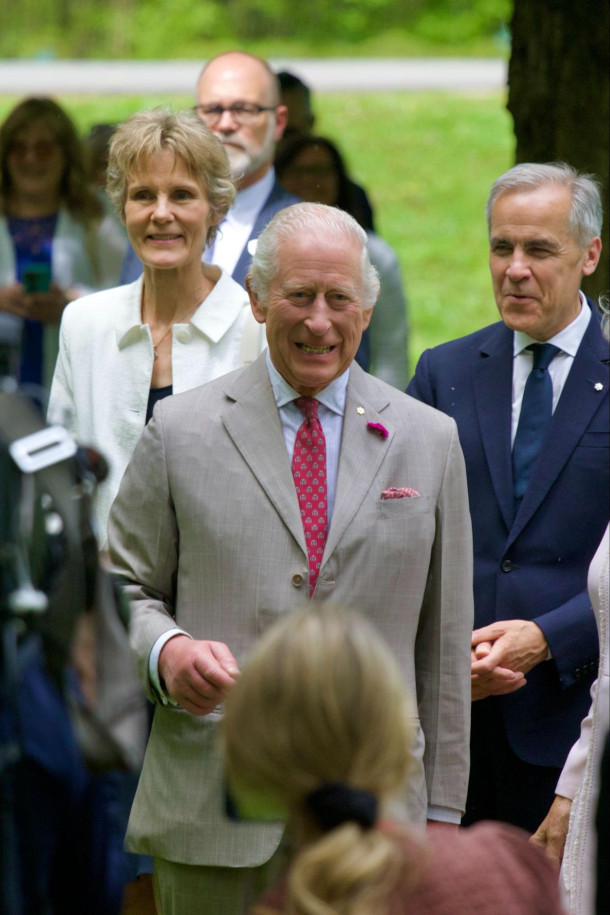
King Charles III has been an environmental advocate for more than five decades. (Photo: Hayden Soloviev, Wikimedia Commons, CC BY 4.0)
CURWOOD: Pope Francis was, of course, known for his encyclicals Laudato Si, and then Laudate Deum, advocating "Care for Our Common Home," and we've seen Pope Leo attending a Climate Justice Conference. I mean, to what extent is Pope Leo following in the footsteps of Pope Francis? And to what extent might he be willing to go even further?
JUNIPER: He evidently is following in the path that Pope Francis so powerfully laid out. Whether he will go further, I don't know, but under the circumstances and the extent to which we are now in the face of a gathering emergency when it comes to climate change, it may well be that he does feel as though he needs to say more and to do more in painting a picture of a really urgent situation that now needs to be taken very much more seriously than is presently the case, certainly in some countries.
CURWOOD: So King Charles and Pope Leo are faith leaders. They're heads of state, but they're not politicians. What is the power, what is the value of them coming together on these concerns as faith leaders, beyond the immediate sphere of political action?
JUNIPER: Well, that's a really good question, Steve, and I think the power of this is absolutely enormous. And the reason I say that is because following many decades of reflection myself, I think it becomes clear that our failure thus far to deal with climate change and to deal with the extinction crises and the degradation of ecosystems, this is not something that we can put down to a lack of information or a lack of awareness. I think it is down to the extent to which these questions have been seen as scientific or technical issues, or issues that are dealt with in policy, when in fact, if you look at the roots of our difficulties at the moment in being able to rise to the challenges at hand, it's very much more about our worldview and the extent to which we have been progressively disconnected from nature and our collective philosophy has become separated from the functioning of our natural world, because that sacred nature of nature was very much there in the teachings of early Christianity, and in his book Harmony, which was published in 2010, the King speaks about the other religions, Hinduism, Taoism, Islam, and the extent to which all of these, in their early manifestations, had a very strong relationship with the sacred nature of creation, which was seen to be the work of God and thereby something which we should take care of. And so for these leaders to be thinking about the joint teachings of the Anglican Church and the Catholic Church in ways that brings creation and God's work back to center stage, I think is a really, really important part of how we begin on this journey towards a more sustainable and harmonious future.
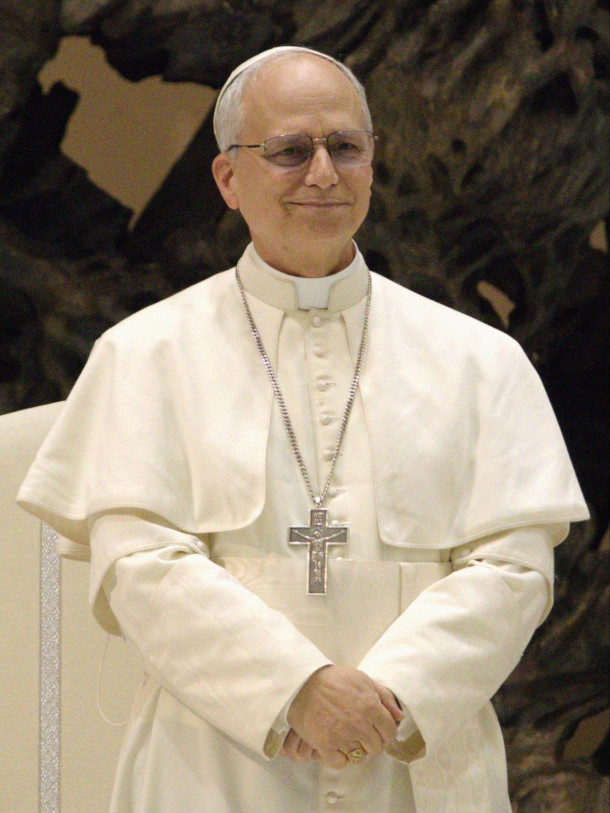
Pope Leo XIV appears to be following in the footsteps of the late Pope Francis in his concern for the environment, our guest Tony Juniper says. The Pope recently attended the “Raising Hope for Climate Justice” Conference, where he reflected on the ten year anniversary of Pope Francis’ encyclical, Laudato Si’. (Photo: Edgar Beltrán, The Pillar , Wikimedia Commons, CC BY-SA 4.0)
CURWOOD: Here in the United States, Tony, there were many moves made on the policy level to deal with the racism here, but it was the Black church in the South that really led the movement that changed social attitudes as well as the law. This was not something which even a Supreme Court decision hadn't been able to settle in this country. So to what extent do you think having two of these most important leaders of major religions stepping out this way on the question of the environment and, as you say, care for creation, what chance does that have to make the kind of breakthrough that those Black preachers and then white preachers, by the way, were able to do on the matter of race in the United States?
JUNIPER: Well, I think that's a really good parallel, Steve in drawing the distinction between the law and policy on the one side and a social movement on the other, which brings about change from the bottom up through people shifting their attitudes and shifting their values. And if we are going to shift the world away from its self-centered, consumerist, self-destructive path that it's on at the moment, we're going to need to foster much more of a groundswell of change. And so for leaders who are beyond politics and who bring a spiritual dimension, and who are by definition, able to take the long view, because they have their roles for life, that's a very different offering to society. And it's very interesting that Pope Leo and I know King Charles see very strong relationships between these questions of social justice and environmental themes. And indeed, the encyclical that Pope Francis released before the Paris agreement negotiations in 2015 really brought these matters of justice and ecology very close together, and Pope Leo has reinforced that message since he has become Pope. And I know that King Charles very much thinks in these terms of these linkages between human well-being and the ecological challenges that are before us, and hopefully those messages being brought out by these two leaders at the tops of these two massive global religious movements, this can begin to filter down to inform and inspire the grassroots. In many ways, they've opened the door for what I hope is a reawakening of some of the implicit values in Christianity. The ecological side perhaps will begin to be given more weight as a result of this meeting, and linked to some of those more familiar struggles about fairness and justice that have been in the church in different ways for a very long time.
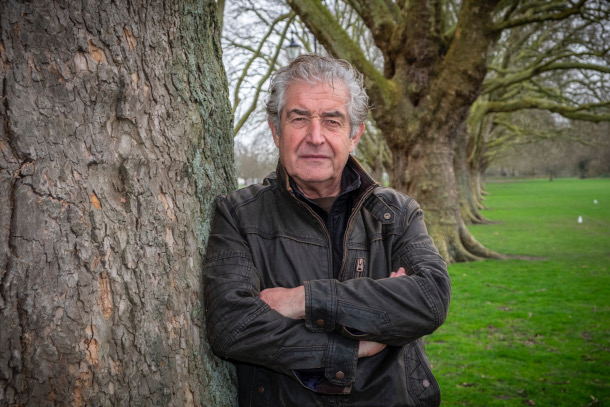
Tony Juniper is a former head of Friends of the Earth UK, has long advised King Charles III on the environment and climate, and now chairs Natural England, a government conservation agency. He’s also the co-author of King Charles’ 2010 book, Harmony: A New Way of Looking at Our World. (Photo: Jason Bye)
CURWOOD: So COP30 is underway now in Brazil. So what kind of impact do you think this recent display of unity from these two religious leaders will have on the talks there?
JUNIPER: It can only be positive at a time when the world is divided and there's very visible conflict and much discussion about the need for unity, these two leaders coming together on this subject at that moment is very important. And if you look back at the impact of Laudato Si and the Pope Francis encyclical that was published a couple of months before the negotiations in Paris that led to the Paris accord, one can only hope that there will be a signaling of the need for people to be working together coming from these faith leaders in a way which will have a visible impact on the negotiations. But of course, the world is in a very difficult place at the moment, with all sorts of discontinuities of consensus compared to where we were a decade ago. I do very much hope that what we will see in Brazil is a reaffirming of that consensus and world leaders departing there with every intention to redouble their efforts back home, but the momentum from the meeting of the Pope and King Charles taken forward to COP30 hopefully will see us in a space early in 2026 when we see the political ambition and the practical action really ramping up as a result.
CURWOOD: Tony Juniper is the Chair of Natural England, a government conservation agency, and was co-author with then the Prince of Wales in the book Harmony. Tony, thank you so much for taking the time with us today.
JUNIPER: An absolute pleasure, Steve, so nice to see you again.
CURWOOD: By the way, a documentary film titled Finding Harmony: A King’s Vision, about King Charles’ environmental legacy and spiritual philosophy, will be released in early 2026.
Related links:
- Read the press release from the Vatican
- Vatican News | “King’s Visit ‘Confirms Closeness Between Catholic and Anglican Churches’”
- Vatican News | “Pope: God Will Ask Us if We Have Cared for Our Common Home’”
- Listen to our conversation with Tony Juniper about King Charles III’s environmental legacy
- Harmony: A New Way of Looking at Our World, co-authored by then-Prince of Wales, Tony Juniper, and Ian Skelly (e-book version)
- Read Laudato Si’
- Read Laudate Deum
[MUSIC: Gregory Alan Isakov, “Sweet Heat Lightning” on Appaloosa Bones, Suitcase Town Music under exclusive license under Dualtone Music Group, A division of MNRK Records]
CURWOOD: Next time on Living on Earth, the story behind the groundbreaking “Six Cities” study that awakened us to the dangers of air pollution.
POPE: What we found is that in the most polluted city, there was about a 25 to 30% increase in mortality risk. Now, that was stunning because cigarette smokers, at the time we knew that there was about a 100% increase in mortality risk, but only about 25% smoked. But what we found is that there was about a 25% increase in mortality risk from just breathing, and of course everybody breathes. And so, the results implied that air pollution in the more polluted cities were contributing as much to attributable mortality as even cigarette smoking.
CURWOOD: The “Six Cities” study, next time on Living on Earth.
[MUSIC: Vision String Quartet, “Samba” on Spectrum, Parlophone Records Limited, a Warner Music Group Company]
CURWOOD: Just ahead, hiking on wheels! Stay tuned to Living on Earth.
ANNOUNCER: Support for Living on Earth comes from the Waverley Street Foundation, working to cultivate a healing planet with community-led programs for better food, healthy farmlands, and smarter building, energy and businesses.
[CUTAWAY MUSIC: Vision String Quartet, “Samba” on Spectrum, Parlophone Records Limited, a Warner Music Group Company]
Hurricane Melissa Recovery Effort
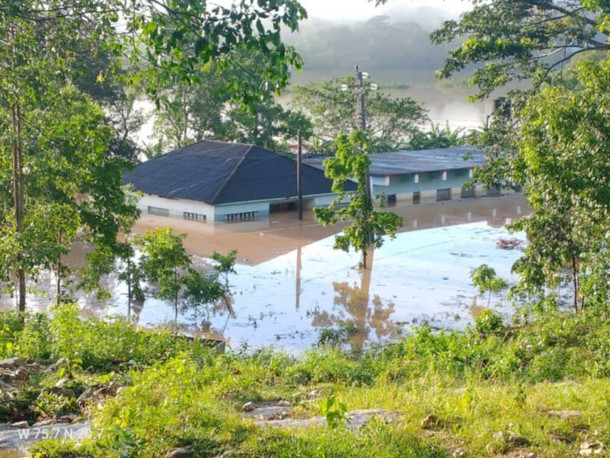
Heavy flooding in Mayarí, Holguín after Hurricane Melissa hit Cuba as a major Category 3 storm on October 29th. (Photo: Courtesy of José Luis Tan)
CURWOOD: It’s Living on Earth, I’m Steve Curwood.
DOERING: And I’m Jenni Doering.
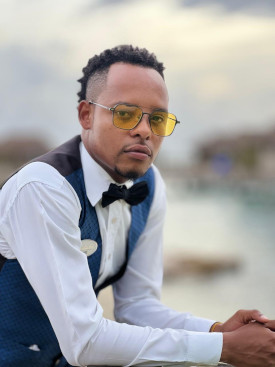
Makare Barnes works as a butler at Sandals South Coast in White House, Jamaica. A tree fell on his house in Westmoreland while he was waiting out the storm inside. (Photo: Courtesy of Makare Barnes)
The climate crisis made Hurricane Melissa worse in every aspect, according to scientists at World Weather Attribution. The rapid intensification, prodigious rainfall, and blistering winds were all fueled by warmer than normal air and ocean water, conditions that climate disruption makes six times more likely. The storm was a catastrophic Category 5 with 185 mile an hour winds when it made landfall in Jamaica and for the people there it was a very long and harrowing night. Makare Barnes lives in Westmoreland Parish on the hard-hit West Coast of Jamaica and heard trees snapping all around.
MAKARE: There's nothing you can do. You're just hoping that none falls on your house, which it did. My neighbor tree fell on mine. But we’re safe and sound.
DOERING: Makare works at a resort near the town of Black River, which was almost totally destroyed, and many of his coworkers lost their homes after the ferocious wind ripped their roofs right off.
MAKARE: They told me like they hear the whistling. And then the roof just -- [SNAPS FINGERS] -- went away. Just went up.
DOERING: By the time the storm got to Cuba the wind speed had slowed to 120 miles an hour, but it was still a major Category 3 hurricane causing extensive damage. And the rain absolutely poured down. With the relief and recovery effort now underway, to learn more especially about the situation in Cuba we’re joined by Marianna Kuttothara, Head of Health, Disaster, Climate and Crisis for the Americas at the International Federation of Red Cross and Red Crescent Societies. So Marianna, can you walk us through the steps taken to assist in the immediate aftermath of this storm?
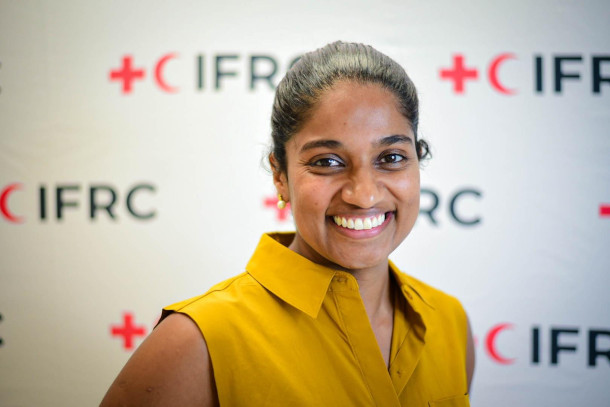
Marianna Kuttothara, Head of Health, Disaster, Climate and Crisis for the Americas at the International Federation of Red Cross and Red Crescent Societies. (Photo: Courtesy of IFRC)
KUTTOTHARA: Yeah, I can say, well, the first thing is to check that everyone's okay. Immediately, the priorities were to send teams to see what the situation was, provide food, water, shelter. So Jamaica Red Cross was also helping manage shelters in the immediate aftermath. And Cuban Red Cross as well, they not only supported with preventive evacuations, but also there were evacuations that were happening right after to prevent people from being in further distress. One of the key needs that's emerging both in Cuba and Jamaica, and was probably one of the first actions, was also providing mental health and psychosocial support. So both Jamaica and Cuba are, unfortunately not strangers to hurricanes. We see that Melissa is hitting Jamaica just 16 months after Hurricane Beryl, and in Cuba, Melissa is striking just a year after Hurricane Oscar, right? So this level of catastrophe and damage also brings a lot of trauma and need for not just the physical well-being, but also the mental health support.
DOERING: Where did hurricane Melissa hit Cuba hardest? And what is it like in those areas right now?
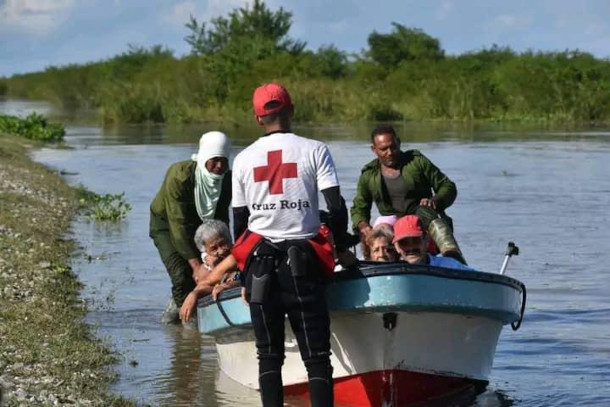
The Cuban Red Cross helped rescue hundreds of stranded people when the Cauto River flooded in the wake of Hurricane Melissa. (Photo: Courtesy of IFRC)
KUTTOTHARA: So hurricane Melissa hit Cuba on the eastern side of Cuba, it actually made landfall in Santiago de Cuba. And I want to again highlight that this were areas that had been just a year ago affected by Hurricane Oscar. But there is also arbovirus outbreak that had been declared. So that's like dengue, chikungunya and other vector carrying diseases, or puche is another one. So this is a compounded disaster, so to speak, right? Part of the reason why it's hard to get as much information as connectivity, right? So power outages were already a challenge, and even more so now. But similarly, there are situations where communities have been cut off because of landslides and access, or just poor road conditions, houses that are quite destroyed, if not completely destroyed, health needs that were already existing, but also access to safe water is a challenge. And then there's also concern about just health issues being further exacerbated, the existing health issues now that there's standing water and these vector borne diseases are likely to proliferate.
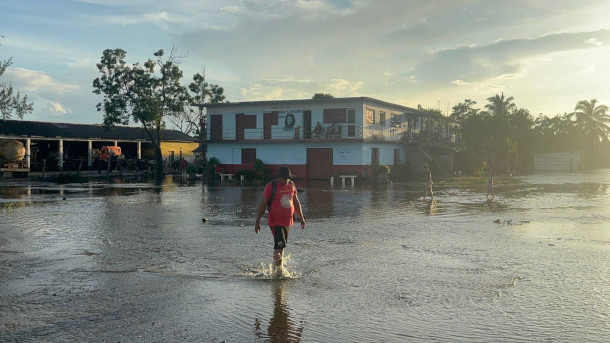
Extensive flooding in the province of Granma has destroyed property and crops, leaving many people homeless. (Photo: Courtesy of IFRC)
DOERING: Can you tell us what you've heard about someone in Cuba who is actually there?
KUTTOTHARA: Yeah, we have a colleague who is based in our Santo Domingo office who is currently in Cuba. He traveled in the immediate aftermath, and he was telling us, yeah, precisely this, just seeing the trauma in people's faces, the despair, the need for support. I think sometimes we also focus on just the sadness of the situation. But he was also impressed by the incredible work that the Cuban Red Cross is doing, immediately mobilizing, helping communities, coordinating with local authorities and other community organizations to take people out of their homes, ensure that they're provided with essential relief items.
DOERING: And I understand that the recovery effort that the Red Cross is embarking on, you're looking at 24 months of doling out this aid. I mean, I know it takes a long time to recover from this kind of a disaster. Why does it take so long for people to get back on their feet?
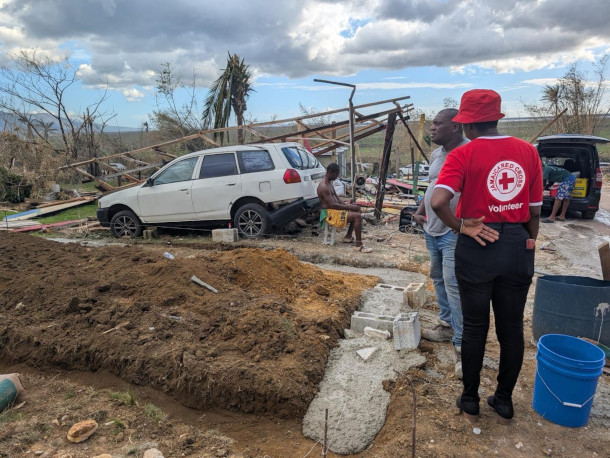
Recovery efforts are well underway in Jamaica, where Red Cross volunteers work with those whose homes sustained heavy damage in Hurricane Melissa. (Photo: Courtesy of IFRC)
KUTTOTHARA: Yeah, I would say that there's kind of two phases, right, the relief phase, as we say, which is the immediate needs and then, as you rightly mentioned, the recovery, right? And recovery is not just about surviving, right? It really is about being in a better state. And I would even say making sure that people are thriving. And unfortunately, we can't say no other hurricane is going to affect Jamaica or Cuba. We know this might happen again. It might even happen, we're still not out of the hurricane season, so it's about building community resilience, right? And how can we better prepare for a future disaster of this magnitude. For example, in Jamaica, part of the recovery efforts include strengthening existing community disaster response teams or creating or reactivating new ones. And why? Because the communities are obviously the first ones affected, but the first ones to respond themselves right. Making sure that communities prepare for these type of disasters and they can do things to potentially mitigate the risks. That includes things like nature-based solutions. Typically, one of the examples referenced is planting mangroves to reduce the impact of storm surge in coastal communities, or in terms of shelter and the reconstruction we don't just want people to patch up their houses, but really what we call “build back better,” that means using better material, improved construction techniques that take into account these potential disasters.
DOERING: And on that note, how important is it for aid efforts to be incorporating the climate crisis? How important is it to be thinking about our future here?
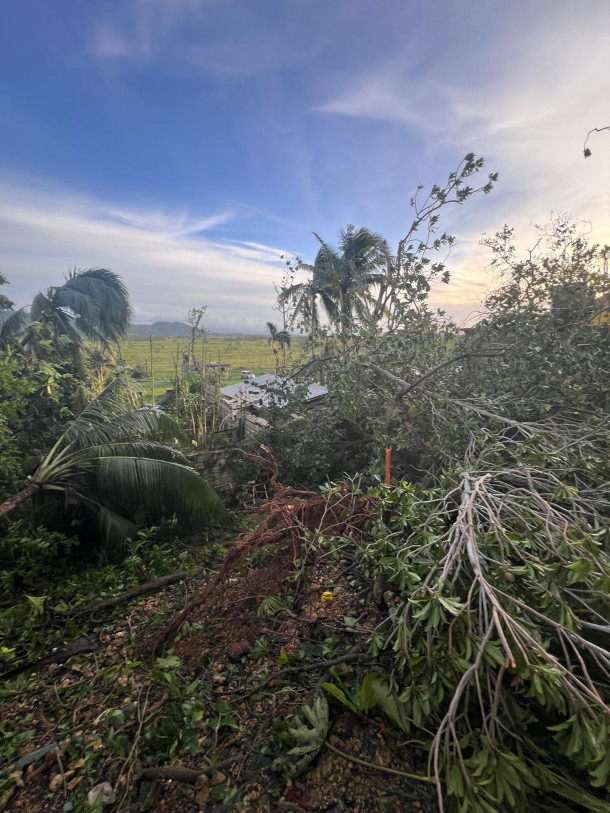
Makare’s home after a tree fell on it during Hurricane Melissa, which also wiped out all of the fruit trees in his yard. (Photo: Makare Barnes)
KUTTOTHARA: Yeah, I would say it's critical. I think, you know, recovery and resilience need to be part of our just a continuous investment and not one offs. We're seeing quicker intensification of storms like Melissa and we're experiencing just more and more disasters, right? So our capacity to just operate on, just solely thinking or solely acting on just a quick relief phase is going to be stretched, and we're also seeing that the scale of needs is increasing, but the financing is not necessarily increasing that proportion. So we have to think about, how do we invest smartly? And investing smartly means making sure that we are better prepared and building that resilience.
DOERING: Marianna, before you go, amid this very difficult situation for many people in the Caribbean, what gives you hope?
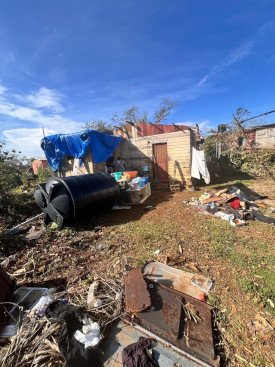
Hurricane Melissa hit the southwest of Jamaica as a Category 5 storm with winds over 185mph. The storm, which left more than 70% of the island without power, caused extensive damage to homes and infrastructure. (Photo: Makare Barnes)
KUTTOTHARA: I think what gives me hope is seeing how quickly people are just readying themselves to support, and this comes at different levels, immediately after the passage of Melissa in both Jamaica and Cuba, the teams reached out. We reached out to them, and we were talking, for example, with Jamaican Red Cross colleagues who were under a tree trying to get connection. Their headquarters was damaged. Water was leaking in, I think there was a little bit of roof damage. And with the limited connectivity they had they were giving us a quick update of what they were seeing, telling us about the actions they were taking, running the shelters, providing psychosocial support, immediate relief distributions, but also requesting our support to mobilize our global network. And the same thing goes with Cuban Red Cross, and just outside of the affected countries, we have been receiving not just requests to understand what is happening, but also offers of support. And I think that shows the strength of our human solidarity, that it's not bound by our traditional geographic borders, and that we even in the midst of chaos and disaster and just the mammoth recovery that is ahead, people are putting all their efforts together and resources together help those who've been most affected, move forward.
DOERING: Mariana Kuttothara is the regional head for health, disaster, climate and crisis at the International Federation of Red Cross and Red Crescent societies. Thank you so much for joining us.
KUTTOTHARA: Thank you very much for having me, and thank you for the opportunity to highlight the work we're doing.
Related link:
IFRC | “20 Tons of IFRC Humanitarian Aid Arrive in Santiago De Cuba Following Hurricane Melissa”
[MUSIC: Johnny "Dandy" Rodriguez and Friends, “Son Montuno” for congahead.com]
Hiking on Wheels
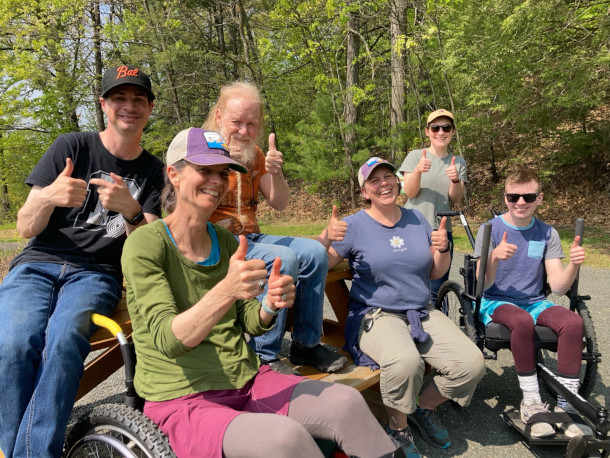
Pictured left to right: Fionn Murphy (All Out Adventures program assistant), Amy Sugihara (All Out Adventures participant), Tom Skinner (All Out Adventures participant), Karen Foster (All Out Adventures executive director), Jenni Doering, and El Wilson. (Photo: Sue Tracy, All Out Adventures)
CURWOOD: Hiking season is coming to an end in the cooler parts of the northern Hemisphere. Unless you’re into winter hiking. But for some folks with disabilities, hiking any time of the year can be difficult to impossible, putting nature out of reach.
DOERING: The good news though is that people who advocate for “trails for all” and adaptive devices and programs are helping to change that. So here’s an encore of our story about accessible trails and more.
WILSON: It’s Living on Earth. I’m El Wilson.
DOERING: And I’m Jenni Doering. El is a producer here at Living on Earth who uses they/them pronouns. But you rarely hear their voice on the show. That’s because El has cerebral palsy, or CP.
WILSON: Cerebral palsy is a disorder you’re born with that changes the way your brain controls your body.
DOERING: In addition to how CP affects El’s voice, they have a hard time balancing. So, El uses a manual wheelchair to get around.
[SFX OF EL’S EVERYDAY WHEELCHAIR]
DOERING: It’s not like a standard-issue wheelchair you’d see in a hospital or an airport. It was custom built to fit and be powered by El, who’s pretty small and lean. This wheelchair can cruise down the Boston hills, give rides to El’s fluffy orange cat, Cleo, and pop wheelies on the dance floor - to Taylor Swift, of course.
[SFX OF EL’S EVERYDAY WHEELCHAIR]
DOERING: But one thing it just can’t do is go offroad.
[SFX OF GRIT WHEELCHAIR]
DOERING: So, on this warm sunny day, El and I have come out to Mount Tom North Trailhead Park in western Massachusetts to learn how people with mobility challenges can explore the outdoors. El is going to take an offroad wheelchair for a spin, so they push out of their usual chair and with a bit of help ease into a more rugged rig called a Grit Freedom Chair.
[SFX - EL GETTING INTO CHAIR]
WILSON: Thank you.
FOSTER: You’re welcome.
DOERING: Now today we’re not just tooling around on a flat patch of dirt. We’re on a new accessible trail that heads up a hill, so El is in for a workout! But I’m confident El can do it, and the Grit chair looks up to the challenge. The tires are wider than the ones on El’s usual chair and the front wheels stick out far in front, so it doesn’t tip forward. And instead of simply rolling the wheels, El is going to push and pull two levers that allow a seated hiker to winch up a hill like this one.
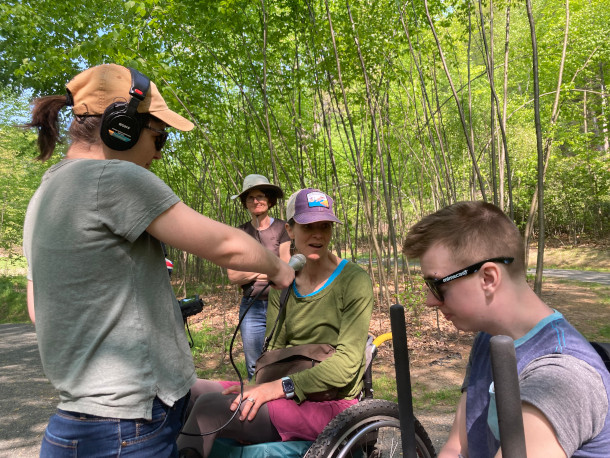
Amy got involved in All Out Adventures after a degenerative disease made typical hiking impossible. (Photo: Karen Foster, All Out Adventures)
[SFX GRIT CHAIR]
FOSTER: We might need the lesson on how to use it, actually, from Amy over there…
WILSON: Yeah.
FOSTER: …because this is her chair.
DOERING: Karen Foster, Executive Director of All Out Adventures, points us toward a woman with a slight frame like El’s with brown hair and an outdoorsy vibe.
FOSTER: Hi, I’m Amy Sugihara, participant with All Out Adventures.
DOERING: Amy is maybe twice El’s age at around 50 and about 8 years ago she was diagnosed with a degenerative disease. So now she uses a manual wheelchair to get around town and the Grit chair for hiking. Like a lot of adaptive sports equipment, Grit Freedom chairs come with a hefty price tag. They cost three to six thousand or so, more than your average manual chair. The VA will cover the cost of a chair for eligible veterans. And others can apply for funding through state grants and nonprofits.
[SFX GRIT CHAIR]
DOERING: The makers of the Grit chair claim it’s twice as efficient as an everyday
wheelchair because of how it uses those levers, attached to gears that turn the wheels. It’s kind of like the difference between climbing a hill on a bike with gears versus a fixie. In fact, the Grit Chair uses bike parts so it’s much easier to repair than a typical wheelchair. But just like riding a bike… it takes practice.
DOERING: Okay, how does it feel so far?
WILSON: Hard ‘cause it’s like a muscle group I don’t use, ever.
DOERING: What you need to know is that El is an athlete who plays sled hockey, a full contact sport played on the ice that can get just as intense as the sport the Bruins play.
[SFX - EL GOING UP THE HILL]
DOERING: But this is still hard work. The crushed stone trail starts out in a meadow and soon climbs into the dappled light of the forest, giving us welcome shade. To make the trail accessible, the path is relatively even, it never gets too steep, and it has flat rest areas that follow each incline. Without accessible trails like this one, hiking would remain inaccessible for many with disabilities.
[SFX - EL GOING UP THE HILL]
DOERING: Now, you might be wondering as I did – why isn’t it paved, if it’s meant to be an accessible trail? Karen Foster says what she’s learned in her work helping people of all abilities experience the outdoors is that unpaved trails can be better than pavement in a lot of ways.
FOSTER: It’s so different being in the woods on an unpaved trail – you know, all the sensory benefits, it’s cooler, we’re in the shade.
DOERING: You feel more connected to the outdoors when you’re on a trail with a more natural surface like crushed stone.
[SFX - EL GOING UP THE HILL]
DOERING: But you also feel the burn, and in the Grit Chair, El is struggling and gratefully accepts Karen’s offer to help push. As we all take a much-needed rest on the way up the mountain, Amy Sugihara tells us she used to take on much more difficult trails than this one.
SUGIHARA: My mobility has been declining gradually over the last ten years. So, I used to be a big hiker, when I was able-bodied. And then as my mobility declined, my world just kind of closed in. And I didn’t think I could hike anymore. I mean it just; it didn’t occur to me that there were ways to get out.
DOERING: Now, this might be El’s first-time hiking since their dad could give piggy-back rides, but “getting out” has never been a problem. El has always had CP, and they were always told, you can do anything with the right attitude and equipment.
WILSON: Oh yeah, water skiing, rock climbing, zip lining, wheelchair lacrosse, wheelchair basketball, and sled hockey, of course.
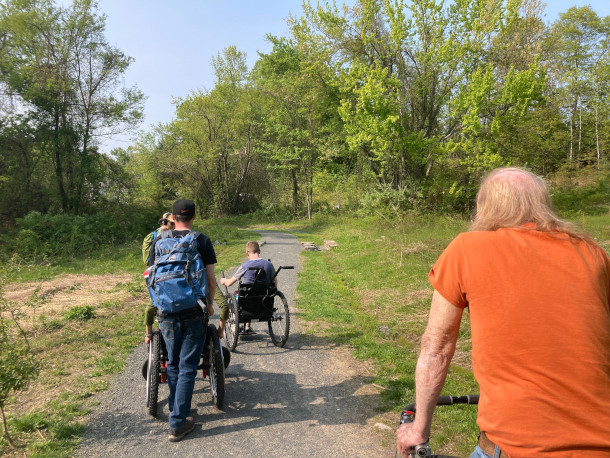
Unpaved accessible trails allow people with disabilities to access more natural landscapes than paved trails do. (Photo: Karen Foster, All Out Adventures)
DOERING: Nothing felt out of reach for El. But Amy had to adjust to a new life without the abilities she’d always taken for granted. So, at first, she felt really stuck.
SUGIHARA: I searched online looking for… outdoor… I don’t remember what I put in exactly, probably “outdoor adventure,” and All Out Adventures popped up. ‘Cause I wanted to do something with my son who was then going into eighth grade. And it was like, “No way! Oh, my goodness!” And I called because I saw their recumbent trike program in the summer. And I thought, “Oh, my son and I could do this together.”
[SFX PHONE RINGING]
SUGIHARA: And Karen answered the phone.
[SFX PHONE RINGING]
FOSTER: When I get to be the person on the phone that says, “Yes,” or grab the right piece of Velcro or the right bike pedals or know the piece of equipment that’s gonna work for somebody… And then I see spouses off on a bike ride together or siblings, you know, ice skating and playing chase. And when I get to see those connections in action, it’s kinda everything.
DOERING: And for Amy, being able to experience the outdoors with her family again changed her life.
SUGIHARA: And it just completely opened up my world. I think we all gain a lot from being outside in nature.
DOERING: Like Amy I love to hike, and before today it had never quite sunk in for me that we don’t all have equal access to the outdoors. El says that can be a tendency for a lot of us able-bodied folks!
WILSON: All of you take everything for granted all the time!
[SFX – EL GOING UP THE HILL]
DOERING: At last, by wheel and on foot, we make our way to the top, to a clearing overlooking the Connecticut River Valley.
FOSTER: This is the view we’ve been hiking for!
DOERING: It’s so green.
WILSON: Wow.
DOERING: What do you think, El?
WILSON: Beautiful. Thank you.
DOERING: As we take in the view, we have a moment to chat with Karen about who All Out Adventures serves.
FOSTER: One of the things that people don’t necessarily understand about our programs is that only about half of our participants actually have disabilities. And the other half are their loved ones.
DOERING: And it turns out, there are a lot more people who can benefit from accessible trails like this one than you might think. Pregnant people, anyone pushing a stroller, elders, and more. But Karen says these trails won’t get built without able-bodied folks stepping up as allies to people with disabilities.
FOSTER: People who don’t have disabilities are the more visible trail users. So, the more they advocate for the full inclusion of everybody in trail design and trail use, that’s really significant.
DOERING: Life has gotten better for people who use wheelchairs since the Americans with Disabilities Act became law in 1990. But there’s still a long and bumpy road ahead to breaking down barriers. And for El and me it’s a long road back home to Boston so we need to get going. And El’s cruise back down the trail offers a chance to test out just how fast the Grit Chair can go.
[SFX: EL GOES ZOOM]
DOERING: Having to run to keep up! But you just go! There they go, off down the hill.
[SFX OF JENNI RUNNING TO KEEP UP WITH EL]
[SFX OF GRIT CHAIR GOING DOWNHILL]
DOERING: Wow! Did you get some adrenaline?
WILSON: [LAUGHS] Uh hah, that was really fun!
SUGIHARA: You know, the more we with disabilities go out into the world and live our lives, the better it is for everybody. I think we’re all better off.
[SFX: WHEELCHAIR]
Related links:
- Learn more about the accessible trail at Mount Tom North Trailhead Park
- Visit All Out Adventures’ website
- Learn more about the Grit Freedom Chair
- Explore sled hockey
[MUSIC: The Karozma Orchestra, Welcome to New York – Instrumental” on The Karozma Orchestra Presents: Best Instrumental Songs of Pop and Christmas 2014, Vol.4, The Karozma Orchestra Digital]
CURWOOD: Living on Earth is produced by the World Media Foundation. Our crew includes Naomi Arenberg, Paloma Beltran, Sophie Bokor, Daniela Faria, Swayam Gagneja, Mark Kausch, Mark Seth Lender, Don Lyman, Ashanti Mclean, Nana Mohammed, Aynsley O’Neill, Sophia Pandelidis, Jade Poli, Jake Rego, Andrew Skerritt, Bella Smith, Melba Torres, and El Wilson.
DOERING: Tom Tiger engineered our show. Alison Lirish Dean composed our themes. You can hear us anytime at L-O-E dot org, Apple Podcasts and YouTube Music, and like us please, on our Facebook page, Living on Earth. Find us on Instagram @livingonearthradio, and we always welcome your feedback at comments@loe.org. I’m Jenni Doering.
CURWOOD: And I’m Steve Curwood. Thanks for listening!
ANNOUNCER: Funding for Living on Earth comes from you, our listeners, and from the University of Massachusetts, Boston, in association with its School for the Environment, developing the next generation of environmental leaders. And from the Grantham Foundation for the protection of the environment, supporting strategic communications and collaboration in solving the world’s most pressing environmental problems.
ANNOUNCER 2: PRX.
Living on Earth wants to hear from you!
Living on Earth
62 Calef Highway, Suite 212
Lee, NH 03861
Telephone: 617-287-4121
E-mail: comments@loe.org
Newsletter [Click here]
Donate to Living on Earth!
Living on Earth is an independent media program and relies entirely on contributions from listeners and institutions supporting public service. Please donate now to preserve an independent environmental voice.
NewsletterLiving on Earth offers a weekly delivery of the show's rundown to your mailbox. Sign up for our newsletter today!
 Sailors For The Sea: Be the change you want to sea.
Sailors For The Sea: Be the change you want to sea.
 The Grantham Foundation for the Protection of the Environment: Committed to protecting and improving the health of the global environment.
The Grantham Foundation for the Protection of the Environment: Committed to protecting and improving the health of the global environment.
 Contribute to Living on Earth and receive, as our gift to you, an archival print of one of Mark Seth Lender's extraordinary wildlife photographs. Follow the link to see Mark's current collection of photographs.
Contribute to Living on Earth and receive, as our gift to you, an archival print of one of Mark Seth Lender's extraordinary wildlife photographs. Follow the link to see Mark's current collection of photographs.
 Buy a signed copy of Mark Seth Lender's book Smeagull the Seagull & support Living on Earth
Buy a signed copy of Mark Seth Lender's book Smeagull the Seagull & support Living on Earth

